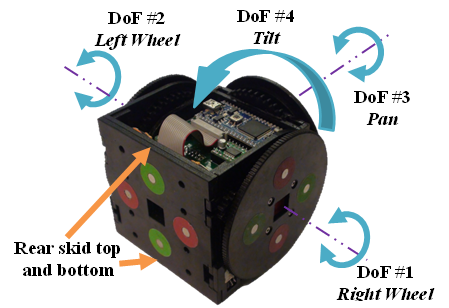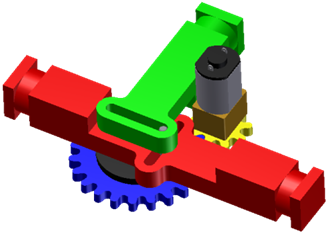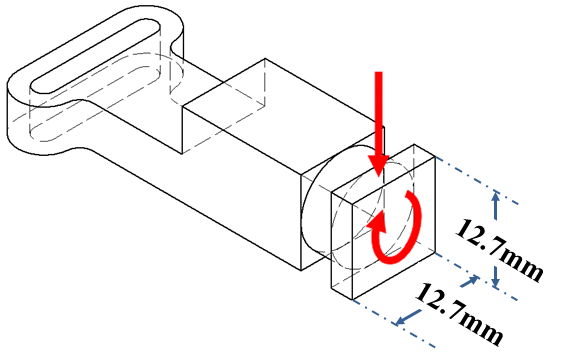Introduction
Self-assembling and self-reconfiguring modular robot systems may one day be capable of achieving varied, complex tasks. Having the abilities of coordinated self-assembly and self-reconfiguration could allow a robotic system to adapt to different or hanging environments on-the-fly. These robotic systems have the potential to exploit self-healing abilities with a reserve supply of low cost robot modules for increased system robustness. They are particularly well suited to situations in which they must adapt to tasks not known a priori, such as search and rescue applications in unstructured environments, planetary exploration and deep space exploration. Two prototype SMORES modules have been developed at the time of this post.
Hardware
Module Overall Design

| Specification | Value |
| Wheel Speed (No Load) | 23 RPM (9V) |
| Pan Speed (No Load) | 23 RPM (9V) |
| Tilt Speed (No Load) | 23 RPM (9V) |
| Maximum Land Speed | 1.1 Body Length/s |
| Wheel Torque (DoF 1 and 2) | 1.2 Nm |
| Pan Torque (DoF 3) | 1.4 Nm |
| Tilt Torque (DoF 4) | 2.3 Nm |
| Static Module Power Dissipation | 1.7 W (9V) |
| Overall Dimensions | 100 x 100 x 90 mm |
| Module Weight | 0.52 kg |
| Modules cantilevered under gravity (DoF strength) | 2 Modules |
| Cost | $300 USD |
Docking Connector Design

Docking Connector Strength

| Specification | Value |
| Number of Ports | 3 Active, 1 Passive |
| Average current draw | 0.85 A (9V) |
| Holding force in tension | 60 N |
| Max. holding force in shear | 3.6 kN |
| Max. torsional load | 11 Nm |
| Modules cantilevered under gravity (connector strength) | 3 Modules |
| Min. time to undock | 0.8 seconds |
| Max. time to undock (worst case docking key position) | 2.3 seconds |
Movies
SMORES – Highlights (self-assembly, self-reconfiguration, mobile modules, 4DoF, manual control, tele-operation)
Internal Gearing
Dock/Undock
Docking mechanism internals
Pan and Tilt Camera mount
Failed docking recovery
Publications
[SMORES.pdf]
-
![[PDF]](https://www.modlabupenn.org/wp-content/plugins/papercite/img/pdf.png)
![[DOI]](https://www.modlabupenn.org/wp-content/plugins/papercite/img/external.png) J. Davey, N. Kwok, and M. Yim, “Emulating self-reconfigurable robots – design of the smores system,” in Intelligent robots and systems (iros), 2012 ieee/rsj international conference on, Vilamoura, Algarve, Portugal, 2012, pp. 4464-4469.
J. Davey, N. Kwok, and M. Yim, “Emulating self-reconfigurable robots – design of the smores system,” in Intelligent robots and systems (iros), 2012 ieee/rsj international conference on, Vilamoura, Algarve, Portugal, 2012, pp. 4464-4469.
[Bibtex]@INPROCEEDINGS{JD:NK:MY:12, author={Davey, J. and Ngai Kwok and Yim, M.}, booktitle={Intelligent Robots and Systems (IROS), 2012 IEEE/RSJ International Conference on}, title={Emulating self-reconfigurable robots - design of the SMORES system}, year={2012}, month={October 7-12}, address={Vilamoura, Algarve, Portugal}, pages={4464-4469}, keywords={robots;self-adjusting systems;SMORES system;chain style reconfiguration;lattice style reconfiguration;mobile reconfiguration;selfassembling modular robot for extreme shape-shifting;selfreconfigurable robots;universal modular robot;Connectors;Gears;Lattices;Mobile communication;Robot kinematics;Wheels}, doi={10.1109/IROS.2012.6385845}, ISSN={2153-0858}, pdf={http://modlabupenn.org/wp-content/uploads/SMORES.pdf},}
Dear Modlab,
It’s nice to know you. I am a senior student at University of Science and Technology of China.
I have just read your paper about SMORES system. Your research is really amazing. It is the first time for me to learn about modular robot and I am totally fascinated by your design, especially the four-DoF module and docking key system. It is intelligent to achieve the control of three connecters simultaneously actuated by only one motor.
May your further research can go on successfully. Best Wishes to you!
Yours sincerely,
Weiwei Tao
Thank you for your kind words Weiwei Tao. Let us know if you would like to know more about SMORES or any of our other modular robotics research efforts. Good luck to you too in your future endeavors.
Cheers,
Jay Davey